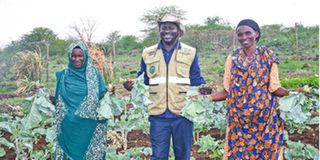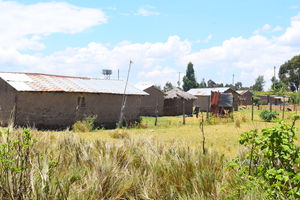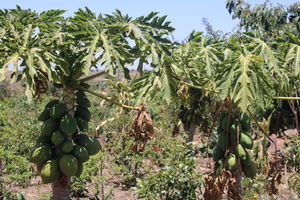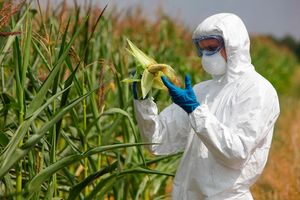
Halakhu Wario, Tom Nyongesa Juma and Qabale Duba at the farm with some of the sukuma wiki yields.
A group in Dololo Dokatu, Marsabit County, has embraced technology that allows it to use as little water as possible in this drought-prone area to get bumper harvests.
Using sunken beds, a smart-farming technique, the residents are growing sukuma wiki and pepper on their one-and-a-half acre farm.
Qabale Duba tells Seeds of Gold that the farm is a combination of what group members used to have as individual kitchen gardens.
They banded together to grow sukuma wiki, capsicum and green pepper to support themselves economically while feeding their families.
“Since we came together, we now harvest bigger leafy vegetables than in the single kitchen gardens,” Duba says through a translator.
Like most women her age in Marsabit, the mother of 10 says she was married off at a young age and never went to school.
She used to have goats, but when they died during the recent drought, she joined fellow community members for training in smart agriculture.
Uplifting venture
Her newly acquired skills and knowledge have lifted Duba. She is one of the farmers who produce food to sell wholesale to vendors who come to the farm two times every week.
“This money is used to settle fees for my six children in school. Being a vegetable farmer is satisfying,” she says smiling.
Working as a group has also helped the members reduce production costs, as they do not outsource labour.
To ensure the vegetables are free of chemicals, group uses a mixture of ash and medicinal herbs.
Duba says three months after the first round of vegetables matured, the group buys seeds and sows for the next season. That ensures continuous availability of vegetables. It is also a way of managing pests.
“Once the sukuma wiki and green pepper matures, they dry out and fall off,” she says.
Making plans
Dololo Dokatu Environmental Group Vice-Chairperson, Halakhu Wario, says smart technology has enabled the group to make long-term plans.
“Getting food was difficult when we moved here. Each of us set aside a small portion of land to grow vegetables. We started by planting cowpeas,” the mother of five says.
The group has set days to harvest vegetables for the markets, but members are free to harvest vegetables any time as long as it is for feeding their households.
“We now have a group bank. After a while, we look at the profits and divide among members. This allows us to take loans,” Wario says.
“Growing vegetables has changed our lives. Table banking means we save and borrow from one another and pay with interest.”
Apart from the sunken bed technology, the group reduces evapotranspiration using mulching. Dololo Dokatu Environmental Group Chairman, Guyo Jarso, says the returns from vegetable farming are quick.
The 20 members of the group used to walk several kilometres in search of water before a borehole was dug in the area.
“Our biggest challenge is the strong winds. The wind blows the mulch away at times,” Jarso says.
Solar pumping system
The cabbages and green peppers thrive because of the solar pumping system. The group has a tank used to store water from the borehole.
Experts from the Swiss Agency for Development and Cooperation, a programme that promotes multiple use of water, say sunken beds allow vegetables to use little water for maximum yields.
“The pump only works during the day. It pumps as much water as it can during the day and allows the aquifer to recharge at night,” says Tom Nyongesa Juma, an officer implementing the Resilient Arid Lands Partnership for Integrated Development (RAPID+) for Food for the Hungry.
Dololo Dokatu Environmental Group got a boost when the government supported it build a seedling nursery greenhouse.
Saku Agricultural Officer, Duba Nura, says Dololo Dokatu is a “heaven on Earth”.
He says area residents and members of the group, who are mainly pastoralists, have found an alternative livelihood by growing vegetables.
“Through partners, we have introduced technology, not necessarily for maize and beans, but for vegetable farming. Even if you have animals, you can’s slaughter them daily for food,” he says.
tebbyotieno62@gmail.com








